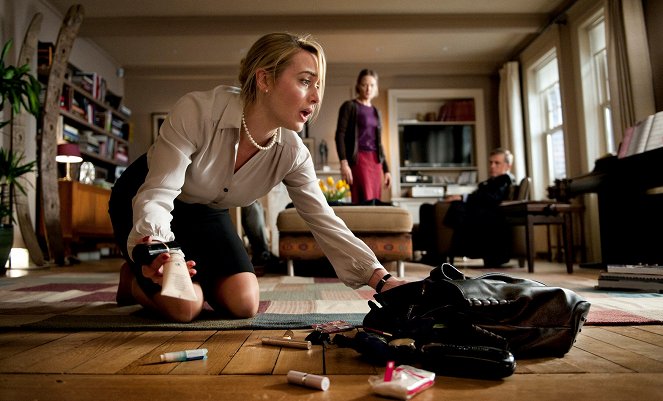Rendező:
Roman PolańskiOperatőr:
Pawel EdelmanZeneszerző:
Alexandre DesplatSzereplők:
Jodie Foster, Kate Winslet, Christoph Waltz, John C. Reilly, Elvis Polanski, Joseph Rezwin, Tanya Lopert, Julie AdamsTartalmak(1)
Két tizenegy éves forma srác összeakasztja a bajszát a helyi játszótéren. Az eredmény: felduzzadt ajkak és törött fogak. Ezután az „áldozat" szülei meghívják a „támadó" szüleit az otthonukba, hogy megbeszéljék a történteket. A szívélyes csacsogásból azonban hamar borotvaéles szituáció lesz, ugyanis kiderül, hogy mind a négy szülő nevetséges elképzelésekkel és groteszk előítéletekkel rendelkezik. Egyikük sem úszhatja meg a küszöbön álló csetepatét. (Big Bang Media)
(több)Videók (13)
Recenziók (11)
Közelebb egy megfilmesített színpadi darab volt, vagyis filmnyelvre lefordítva. Az öldöklés istene nem egy megfilmesített színdarab, hanem egy színdarab, amelyet a filmvászonra filmeztek és vágtak. A színházi színészek nem támaszkodhatnak az arckifejezésekre (amelyeket a közönség távolról nem láthat), ezért túljátszásra vannak ítélve - testbeszéddel és emelt hanggal kell segíteniük magukat. Az ölöklés istene nem fordítja le az előzményeket filmes nyelvre, és filmvászonra statikusan veszi a színházi színészi játékot (arcok közeli képekben). Ezért vádolják egyes nézők azzal, hogy egy felesleges film. Számomra azonban két okból nem felesleges: 1. Még ha valaki be is vitt volna a színházba, hogy megnézzem ezt a darabot, ezzel a szuper-négyes szereposztással aligha láttam volna. 2. Ezt a színészi szuper-négyest nézni azzal a tudattal, hogy Polanski kedvére honorárium nélkül is lelkesen játszottak volna, számomra nézői kiváltság.
()
“My Kokoschka!“ With films such as Repulsion, The Tenant and Death and the Maiden, Polanski demonstrated that he can build tension with just one room and a few actors to the point where we are ready for anything while having no idea what to expect. Carnage is made up of concise scenes, yet it continuously puts great effort into the absolute deconstruction of civilisation (which, together with the enclosed space, is reminiscent of the darker The Exterminating Angel). ___ The quartet of sufficiently different people who are, however, afflicted with the same social pretence gradually forget the basics of polite behaviour and even what social group they belong to. They lose their cool, inhibitions and even control over their own bodies, driven by concealed aggression and instinct (grunting laughter, automatic reactions to a ringing telephone). ___ In contrast to the original plan (a calm discussion in a setting decorated with tulips from Holland), the non-observance of which will most adversely affect Penelope, they begin to reveal their own transgressions and character flaws with devastating honesty. Their attachment to material things (mobile telephone, handbag, cigars, a bottle of Scotch, art books) is merely a triviality to get the ball rolling. ___ Their inability to face the unpleasantness which they would prefer to remove from their lives, like getting rid of a bothersome hamster, comes back to haunt them. We are not watching the failure only of individuals confusedly taking on different roles (man/woman, partner, parent) for a moment, but of an entire community. Only by gradually breaking down the civilisational walls that we build around ourselves is it possible to return from selfishly resolving personal problems to the suppressed collective (un)consciousness. Rejoining the clan that we left voluntarily and whose other members we only pretend to be interested in. The meeting, whose consequences are wisely concealed from us, could be beneficial for the participants at least as a means of returning them to their wild essence (indicated by the drums in the opening and closing background music) and the attendant self-discovery. ___ Behind the comedy, intensified with perfectly timed jokes to the point of inducing a nervous breakdown in everyone involved, there is a bitter, almost anthropological study of human dissatisfaction and the inability to overcome that dissatisfaction. (Their publicly revealed unhappiness derives “only” from honestly describing their current state.) For example, through the entirely banal acceptance of responsibility for parenting. Also, dealing with outside and, for example, even very remote problems (Darfur) doesn’t offer any redemption, but just another way to avoid the essence of the matter at hand. This is correctly pointed out by Alan, whose absolute indifference to the fleeting family-relationship bullshit enables him to have the most sober view of the whole farce (another thing is that his work may be even more fleeting as a result of that indifference). ___ Waltz’s precise gestures and intense emphasis on words with the potential to create conflict, complemented with the nonchalance with which he turns the Longstreets’ apartment into his workspace (or rather a café with a bar) make him the star of the proceedings in my opinion. With his “I don’t think anything” attitude, John C. Reilly is also excellent, as his Michael, an entirely simple man burdened with a mostly unresolved Oedipal complex, is the first to lose interest in pretending. However, the women do not stay in the background, as they are believably hysterical and, at the same time, above the men’s one-upmanship. ___ The mirror in the film serves to optically enlarge the space and, like the placement of the characters in the individual shots, informs us of the current distribution of belligerent forces, while the film itself is also a mirror. If you’re willing to look into it for a mere eighty minutes and think about what you’ve seen, perhaps it will, for starters, make you not brush off the question “How are you?” with the same answer as usual. Yeah, idealism. I’m healing. By observing people. Appendix: It occurred to me later that Carnage could also be understood as a politically incorrect response to The Descendants, a film that avoids the truth with such determination that if there were any sex in it, the people doing it would probably pray even when casting off the masks of civilisation (another one of Alan’s apt observations). 90%
()
(kevesebbet)
(több)
Everything Roman Polanski gains from Christoph Waltz's grimace or Kate Winslet's untenable mimicry is destroyed by the overblown premise that could never work fully outside the theater. All the coming out of doors and calling the elevator is too stupidly unnecessary in the first half, when it is absolutely clear that it will lead to nothing and everything has to return to the two rooms with incomprehensibly violent crutches. The sad irony with directly corrosive satire at its heart would work much better without convulsively snaring the plot in a single place; as it is, this massacre only manages it through hints.
()
Polanski et al. have the misfortune that I saw Carnage at the theatre. There, it made me almost die in laughter, at the cinema, however, I smirked amusingly here and there (mostly over Christoph Waltz’s smirks) and laughed (reminiscing the theatre play). It’s a good film, no doubt, with good performances and direction, but I can’t avoid being disappointed, even though I’m rationally aware that comparing a theatre play with a film is stupid. Though in this case is not that stupid actually, because you can really see the theatrical origin of the film… Some lines are clearly not uttered by a normal film character, but very “theatrically” by a character in a play.
()
Good dialogues are a good foundation of a high-quality dialogue-based movie. The premise itself takes the lead role here – it’s incredibly original – and the actors are doing such a great job it seems they loved the premise as well. My personal favorite was Christopher Waltz and his incredibly arrogant lawyer. Nevertheless, I believe that different viewers will fall for different characters. This movie literally lives and dies with the actors and I believe that a stage play with good actors could yield the same result.
()


